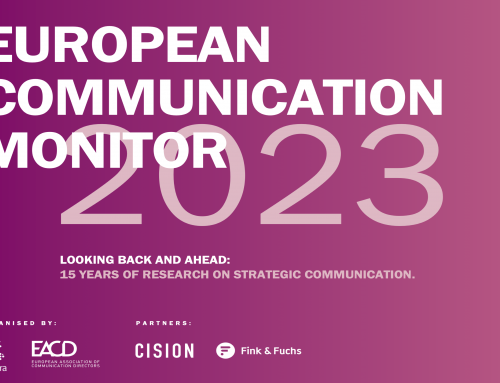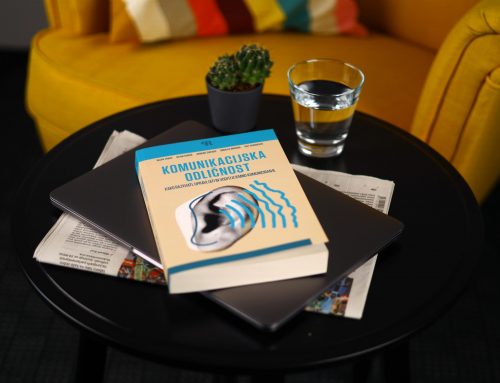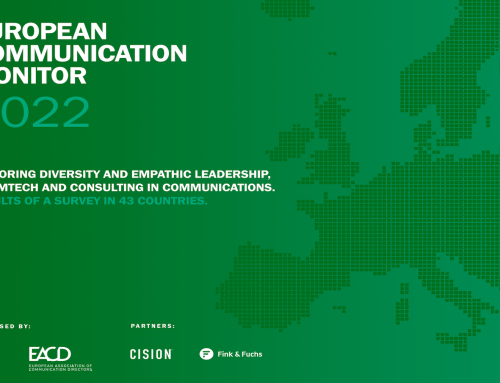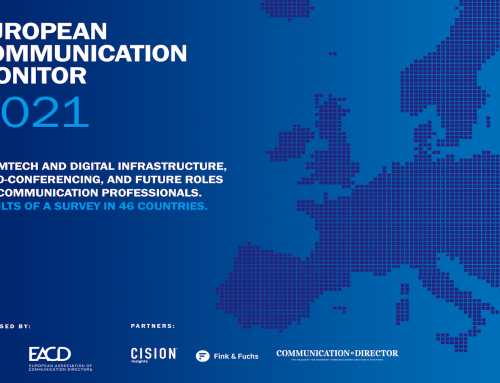The Trust in Communicators study 2019 (#TiCS19) combines results of the European Communication Monitor 2019 from Germany, Italy and the UK regarding trust in different communicators and organisational advocates with a representative poll in the same three countries. Moreover, the research team from Leipzig University (Germany), Leeds Beckett University (UK), and IULM University Milan (Italy) have been interested in perceptions of the general population about public relations activities and whether �this affects the trust in public relations and communication professionals.
The public poll highlighted that communication and PR professionals are trusted and recognised more highly in the UK than in Germany or Italy. However, the general public has a high-level of distrust in these professionals (see Figures below). A trust gap was identified between communications and PR professionals and journalists, but it was not as wide as expected and is closing.
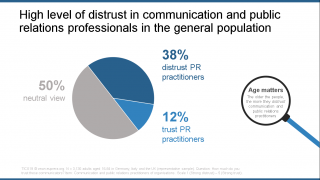
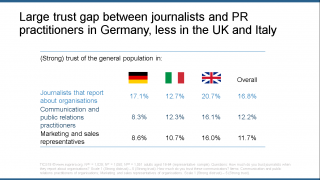
Information about organisations is often spread by people who are not acting in a professional communication role – i.e. organisational advocates such as supportive customers (fans, brand ambassadors), experts in the field (academics, consultants) or activists with overlapping interests. The polls found that external experts are the most trusted of these advocates, but all are trusted more highly than communication and PR professionals (see Figure below). Efforts should be focussed on enabling these advocacy groups to promote the trust-building process.
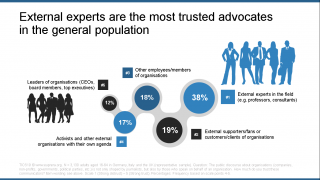
The polls revealed that the general population has fuzzy perceptions about the goals and activities of PR professionals (see Figure below). Whilst communication and PR professionals misperceive the public’s opinion about them and overestimate public trust. These professionals also misjudge their role in the trust-building process and ignore public trust in external advocates.
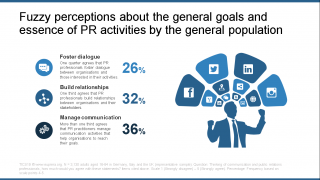
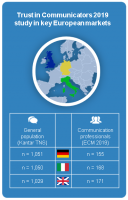 The Trust in Communicators study 2019 was organized by the European Public Relations Education & Research Association and facilitated by Cision Insights and Fink & Fuchs It offers insights based on the comparison of two large empirical studies. Based on thorough academic standards, a representative poll among the general public in Germany, Italy and the UK was combined with a subsample of the ECM 2019 among 494 communication professionals in the same markets. The public poll samples the views of 3,130 adults aged 16-64.
The Trust in Communicators study 2019 was organized by the European Public Relations Education & Research Association and facilitated by Cision Insights and Fink & Fuchs It offers insights based on the comparison of two large empirical studies. Based on thorough academic standards, a representative poll among the general public in Germany, Italy and the UK was combined with a subsample of the ECM 2019 among 494 communication professionals in the same markets. The public poll samples the views of 3,130 adults aged 16-64.
 The Trust in Communicators 2019 study revealed that
The Trust in Communicators 2019 study revealed that
- the trust division between journalists and public relations / communication practitioners is closing. Both professions enjoy a relatively low level of trust (between 8% and 17%, depending on the country). But distrust is relatively high with 34% of adults in Italy distrusting journalists and 42% of Germans distrusting PR practitioners. Journalists are trusted most in Germany and communication practitioners in the United Kingdom.
- external experts in the field (e.g. professors, consultants) are clearly the most trusted of all groups that can speak on behalf of an organisation. Regular employees and members of an organisation should be taken into account as well: their level of trust in the general population is quite high, and they are less distrusted than fans/customers or activists. Leaders of organisations and marketing or PR professionals, on the other hand, are less trusted than all other parties in all countries.
- the general population lacks a clear understanding of public relations activities and what communication professionals try to achieve in their daily work. On the other hand, communication practitioners overestimate the level of public trust in their country in the organisational realm, and they underrate the distrust in all kinds of advocates.
Public relations activities will fail if audiences lack trust in those who talk about or on behalf of organisations. Identifying trusted intermediaries internally and externally is a key challenge for communication and PR practitioners – especially because their own profession, journalists and top managers are all suffering in this respect.
Statements from the initiators

The international research team, Ansgar Zerfass & Markus Wiesenberg (both Leipzig University), Ralph Tench (Leeds Beckett University) and Stefania Romenti (IULM Milan) state:
This study dives deeper into the issues of trust in all kind of organisational representatives and speakers as well as influencers. A representative poll of the general population in Germany, Italy and the United Kingdom unveils the perceived trust in journalists, PR and marketing professionals, and other groups speaking on behalf of organisations. A parallel survey among communication professionals in the same countries shows how practitioners assess public trust in those parties. It becomes clear that communicators overestimate their own role and the role of their leaders. They misjudge and ignore public trust in external advocates. Communication professionals are encouraged to read these results carefully, as new actors like activists or internal and external influencers are becoming more important for all kinds of organisations. We hope that readers will gain new insights into the complex processes and antecedents of trust building from reading this report.
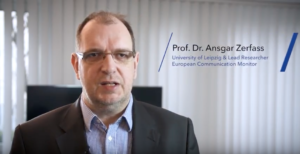 Commenting on the new study, Ansgar Zerfass, coordinator of the international research team, added:
Commenting on the new study, Ansgar Zerfass, coordinator of the international research team, added:
“This study has asked both the general public and organisational communicators about trust in companies. The results show clear divergence in trust perceptions. For those professionals working in the communications sector and representing organisations we urge them to take on board the implications of the study’s findings and place greater importance on internal and external influencers to support the important organisational trust-building process.”
Browse the chart report
Click on the button to load the content from www.slideshare.net.
Load content
 The Trust in Communicators study 2019 was organized by the European Public Relations Education & Research Association and facilitated by Cision Insights and Fink & Fuchs It offers insights based on the comparison of two large empirical studies. Based on thorough academic standards, a representative poll among the general public in Germany, Italy and the UK was combined with a subsample of the ECM 2019 among 494 communication professionals in the same markets. The public poll samples the views of 3,130 adults aged 16-64.
The Trust in Communicators study 2019 was organized by the European Public Relations Education & Research Association and facilitated by Cision Insights and Fink & Fuchs It offers insights based on the comparison of two large empirical studies. Based on thorough academic standards, a representative poll among the general public in Germany, Italy and the UK was combined with a subsample of the ECM 2019 among 494 communication professionals in the same markets. The public poll samples the views of 3,130 adults aged 16-64.








